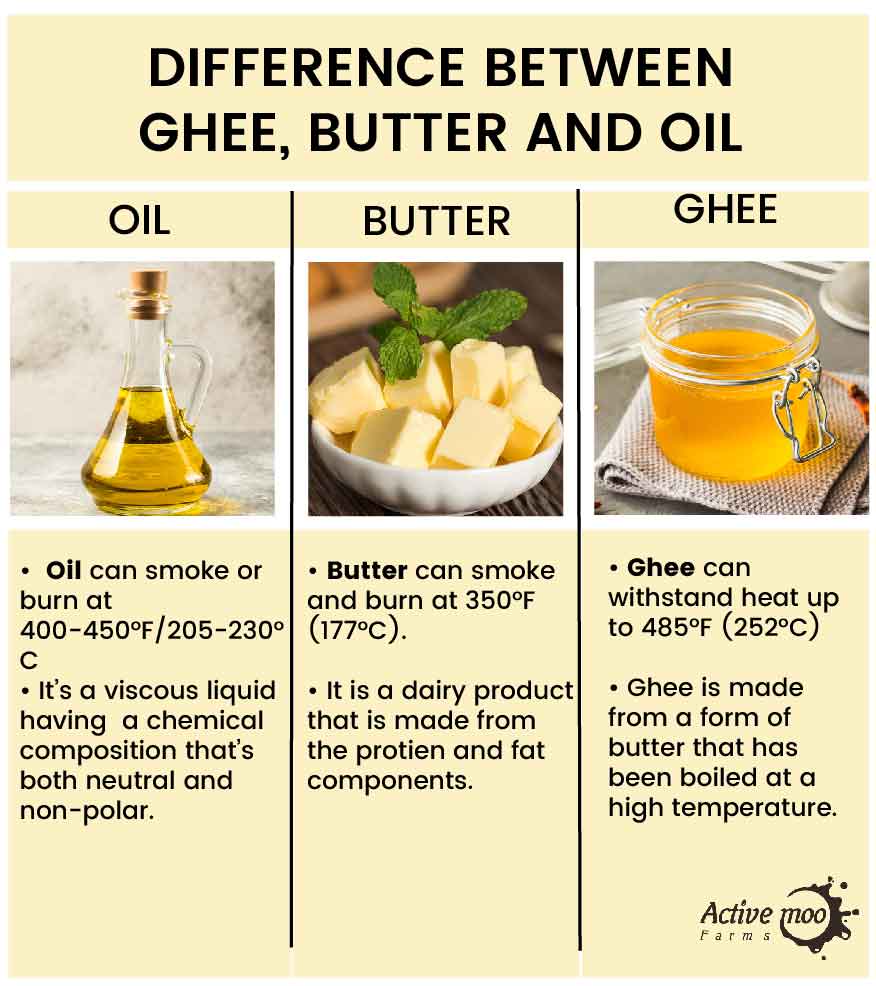Health-conscious folks are continuously looking for new healthier meals and regimens. Not only fitness enthusiasts, but also other individuals, are curious to learn more about ghee vs oil as to what they may add to their healthy diet or find a better alternative. To be more particular, we can now identify our daily meals, what we consume, and what we add to make them more nutritious and enticing.
As a result, what better option for cooking oil, ghee, or butter in the average household? Continuing the buzz, such as ghee vs oil, which is better? Also, which is better for weight reduction, ghee or butter? It is vital to comprehend the comparison and the data.
Also, if we compare butter vs oil, the nutrition facts vary, and butter is not a good choice for cooking because of its lower smoke point. On the other hand, cooking oil is better in comparison.
Although if we differentiate between oil vs butter, we will get to know the difference between oil and butter. People generally use butter for making sweet and savoury dishes. And soya, olive or any other cooking oil is very common in Asian countries.
Let’s have a look at the blog to see what the distinctions are and which is healthier.v
Ghee

Ghee is made by scorching butter at high temps and eliminating the milk residue, which contains a lot of lipids. Also, ghee has a reduced fat content. Ghee, which is high in energy and healthful fats, can be taken in little amounts while making and frying chapatis. So, is ghee healthier than oil? Let’s find out!
Read More: Numerous Benefits of Pure A2 Cow Ghee
Butter

Butter is made mostly from the residue of milk cream using cream separator processes. Saturated fat is present in butter in the form of milk SNF. It has a water content of 16 to 20%. You may produce butter at home using 2-3 cups of cream (malai) that has been collected for 7-9 days.
Cooking Oil

Oils are often high in polyunsaturated fats, which can induce inflammation in the body. As a result, less oil usage is recommended for the human body. But you can also choose olive oil, which contains unsaturated fats and is a healthier option than other oils. You should bear in mind that while ghee and butter may be used for high-temperature cooking, olive oil cannot since it oxidises at high heats.
Oil and ghee is being used typically in Asian households although here in India people usually use vegetable cooking oil. But if we compare oil vs ghee, then ghee has more nutritious elements.
The Actual Difference Between Ghee, Butter and Oil

As we know ghee, butter and cooking oil can be used in different ways of cooking food or in making sweet dishes but here we will understand the comparative difference between them. Primarily vegetable oil contains pure fat and no moisture or water in it which means it won’t evaporate on cooking. On the other hand ghee is made by heating butter to remove solid milk fat and water.
Many questions will come to your mind, such as, ghee or oil which is better for weight loss? Also, ghee or butter which is good for weight loss? Well, nutritionists and medical science say it depends on how a person’s body calibur to digest the calories. Because all saved calories convert into fat, the basic mechanism is that if you want to gain or lose fat, you have to increase or decrease your calorie intake (your daily diet). Although the very interesting thing is that cow ghee consists of Omega 3 and Omega 6, which increase the muscle mass while reducing the body fat. As a result, ghee is far more beneficial for weight loss.
Now let’s check the separate difference of ghee vs butter and Vegetable oil vs ghee.
Difference Between Ghee and Butter
Which is better ghee or butter? Well, if you are looking for the fat and calories, then it makes no difference which product you are consuming. You need to understand the differences between ghee and butter so you can determine which is healthier.
Ghee is made from butter. It has a higher smoking point which makes it a good choice for frying. It also has a richer, fuller flavour, due to the process of simmering it.
Butter is made from cream churned into butter with salt, which gives it its unique flavour profile and texture. The two are not interchangeable in recipes because they have different flavours and textures due to their production processes.
Ghee has a greater smoke point than butter, so it doesn’t smoke as fast. This is the main difference between ghee and butter. Using butter for sweetness is fine but it is mostly pasteurised to increase the shelf life and contains 20% water.
But ghee, on the other hand, contains 100% calories and it is healthier if it is pure in form with no added flavour and pasteurised. However, ghee can be stored for a longer time.
Ghee has an increased fat content and more calories than butter. Ghee consists of higher concentration of fat than butter and more calories.
The difference may vary due to different manufacturers. Also, cow’s and buffalo’s milk typically differ in thickness.
Now, here is the fat breakdown of Ghee vs Butter in 1 tbsp.
| Type of fat per tbsp | Ghee | Butter |
| Saturated | 10g | 7g |
| Monounsaturated | 3.5g | 3g |
| Polyunsaturated | 0.5g | 0.4g |
Apart from their taste, which is healthy ghee or butter? Well, we hope now you are clear about their nutritious difference.
Difference Between Ghee and Oil
Think outside the box with your cooking. Substitute the regular ingredients with ones that might intrigue your taste buds. We know you may be curious about learning ghee or oil which is better? Here you go and get your answer.
Ghee is butter that has been made pure by heating it. It is often used to minimise spillage and to avoid mixing in fat. Oil is pure, unadulterated fat.
When you cook with butter, you will observe that it will exude froth once heated and melted. This froth will be filtered so that no oil is wasted or abandoned. The residual oil from the butter will become pale yellow and will be filtered to eliminate any remaining pieces before being kept as ghee.
Cooking oil is not a conductor of electricity. In case it is in contact with the electric wire, it will have the same charge as water and will not be able to generate an electric current. Further, cooking oil can be described as “sticky” or “greasy”.
Cooking oils can be extracted from a variety of seeds, but many go through processes to change the taste and aroma. For example, sunflower seed oil will be compressed until a liquid is released, which is further refined to have the appearance of cooking oil on store shelves.
There is an importance on using the correct cooking oils, depending on the type of dish. Using a flavourful cooking oil will make a more flavorful meal that most people appreciate.
Ghee is better for those with a sensitive stomach because it has been extracted in a different way. The butter is churned before being processed, making it less viscous. The result is better digestion.
Cooking oil, on the other hand, contains only properties found in fruits, vegetables, and nuts. This suggests that our bodies need extra fatty acids, such as trans fats, to keep the immune system healthy.
These are the qualities and distinctions of ghee and cooking oil. It is your responsibility to choose the right ingredient and determine which one is most suited to your dish and which one is healthier.
Hence, you are pretty clear about the difference between ghee and oil, but if you are also looking at a vegetable vs butter comparison, then the least difference is that butter is mostly used for sweetness. On the other hand, vegetable oil is mainly used for cooking.
Nutritious Facts About: Ghee vs Oil vs Butter
Below is nutritional value for one tablespoon of ghee, butter and oil
Ghee | Butter | 100% pure vegetable oil | |
Calories | 123 | 100 | 120 |
Fat | 14 grams | 11 grams | 14g |
Saturated fat | 9 grams | 7 grams | 2g |
Monounsaturated fat | 4 grams | 3 grams | 3g |
Polyunsaturated fat | 0.5 grams | 0.5 grams | 8g |
Source- Healthline
Which Types of Fat are Healthy?
Essential fatty acids should be included in a healthy diet, and can be found in fish, olives, nuts, fruits and seeds.
Fat is divided into two different types-
- Saturated Fat
- Unsaturated Fat- It includes two types
- Monounsaturated Fat
- Polyunsaturated Fat
Monounsaturated and polyunsaturated fats work to maintain healthy cholesterol levels and offer protection from heart disease.
To have a healthy diet, you need to consume both unsaturated and saturated fats.
Unsaturated fats are high in concentration and are found in plant-based products like peanut, oranges, and olive. But saturated fat includes things like meat.
Omega-3 is very essential and beneficial polyunsaturated fat for a healthy body. A good source of it can be ghee, walnut, soybean, fish etc.
Too much saturated fat can lead to accumulations and increased risk of heart disease and high blood cholesterol. You should manage your total and saturated fat intake in a single day.
Saturated fats can promote high cholesterol and plaque buildup, which makes it more difficult for the body to transport blood and oxygen. This raises the risk of having a stroke or developing cardiovascular disease.
Overeating anything will obviously have negative consequences, but eating in moderation is best.
Ghee, Butter or Oil - Which is a Better Option?
Butter, ghee, and oil all offer health benefits and are common household items in Indian families. While ghee has long been used to cook and grease chapatis, butter is a relatively recent addition that is now used to cook and oil flatbread. Most users use oils to cook a variety of foods, with a variety of oils.
Now the question is, which one is a better option for you? All three, however, offer distinct advantages that must be utilised in a certain manner.
Heads Up
The best recommendation we can give here is to avoid consistent consumption of any particular oil. Keep replacing your cooking oil with ghee, olive oil, rice bran oil, sometimes use mustard (sarson) oil. Use ghee if you want to change your tongue’s taste. Also, it’s easy to make ghee at home to be sure about purity or order farm-fresh ghee. It’s also no issue if you want to taste the sweetness of butter sometimes. Keep a healthy fat balance in your body to walk on the road of healthy life.
Now you know ghee, butter or cooking oil, which is better.
Your Takeaway!
If you are only concerned about calories and fat then it makes no difference choosing between oil, ghee and butter.
They have essentially identical nutritional compositions. Adding butter on your dish adds the sweetness in your dish also no good use in cooking and less health benefits.
Although oils are good for cooking because of the high smoke point, you should avoid consistent use of any particular oil. You should replace the cooking oil with any alternative. Because oil is high in polyunsaturated fat which is surely bad in long run health. Maintain the balance of fat by switching to various cooking oils.
Pure ghee, on the other hand, has many health advantages, and a higher smoke point to cook the dish. Also ghee has low fat count and natural nutrients Omega 6 and Omega 3 which helps in weight loss. Hence, now your query for ghee or butter which is better for weight loss is resolved.
Ghee is a preferable alternative if you cook at high heat also keeping the body functionality at its best. It may be found at grocery stores, and online. You may also make your own! But if you’re looking for the best and healthiest A2 cow ghee, go no further than Active Moo Farms.
So, what is your opinion on which is better ghee or oil? Let us know in the comment section.
FAQs
What is Butter oil?
Butter oil refers to concentrated liquid butter, after removing the water and SNF from butter or milk cream. Butter oil is also known as Anhydrous Milk Fat (AMF), dry butter fat or hydrated butter fat.
Butter oil has more shelf life than butter, which is also a reason to convert the butter into butter oil.
What is Ghee Oil?
Ghee is a clarified butter after removing water and milk fat from the butter by heating it at high temperature. The tradition of ghee is mostly popular in India and south Asia
Is Ghee the Same as Clarified Butter?
Yes, ghee is also known as clarified butter. The methods to convert them into ghee or butter are different. For example if you evaporate the water and partially separate SNF from milk it converts into butter, and if you heat the butter at high temperature then it will convert into clarified butter.
Which Ghee is Recommended for Cooking?
Comparatively not all ghee would be the same but according to the research, A2 cow ghee is healthier than any other ghee and also has a better taste. Active Moo Farms is a trusted and certified company to serve you the pure, healthy and tasty ghee.
Is Ghee Healthier than Olive Oil?
Yes, ghee is healthier than olive in many facts. Ghee can be heated to higher temperatures without breaking down, making it ideal for high-heat cooking.
Ghee has several advantages over olive oil:
– Ghee is high in butyric acid and CLA, two healthy fats that aid in weight loss.
– Butyrate acid in ghee helps to prevent colon cancer and ulcers.
– Ghee is high in vitamins A, D, and E, as well as selenium, zinc, and potassium.
Is Ghee a Butter Replacement?
There’s been a lot of debate recently about whether ghee is a better option than butter. While both have their pros and cons, but yes ghee is a butter replacement because:
One of the main advantages of ghee over butter is that it has a higher smoke point. Ghee is a good source of healthy fat and vitamins. Also, it has a creamier taste than butter. If you worry about calories don’t overeat ghee, keep it in moderation. Hence ghee is butter replacement.

